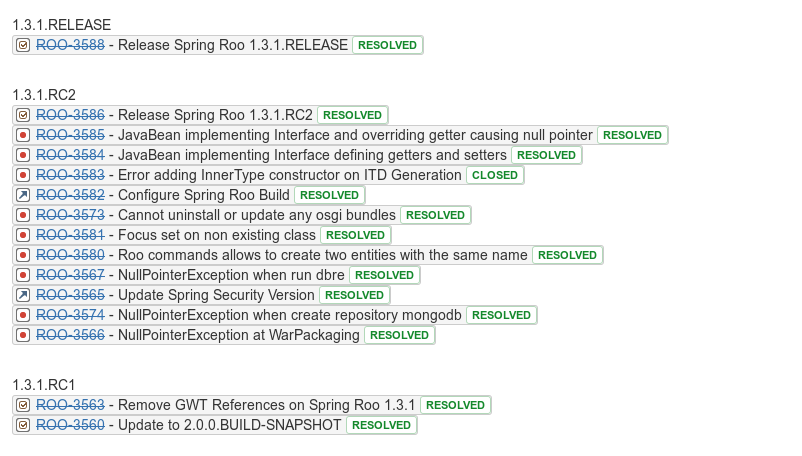Usage
Maven Repository
From Release 3.0.1 this plugin is available from MAVEN CENTRAL REPO If you would like download & test the latest SNAPSHOT, includes the following repository declaration in your POM
<pluginRepositories>
<!-- IF YOU WANT STAY TUNED ON UPDATE REMOVE COMMENT -->
<pluginRepository>
<id>sonatype-repo</id>
<url>https://oss.sonatype.org/content/repositories/snapshots</url>
<releases>
<enabled>false</enabled>
</releases>
<snapshots>
<enabled>true</enabled>
</snapshots>
</pluginRepository>
</pluginRepositories>
Use Site Descriptor
<configuration>
<endPoint>${confluence.home}/rest/api</endPoint>
<spaceKey>DOCS</spaceKey>
<serverId>server_id_configured_in_settings_xml</serverId>
<parentPageTitle>Home</parentPageTitle><!-- PARENT PAGE IN THE GIVEN SPACE -->
<wikiFilesExt>.confluence</wikiFilesExt>
<siteDescriptor>${basedir}/src/site/confluence/site.yaml</siteDescriptor>
<failOnError>true</failOnError>
</configuration>
Inject custom properties within template
<configuration>
<endPoint>${confluence.home}/rest/api</endPoint>
<spaceKey>DOCS</spaceKey>
<serverId>server_id_configured_in_settings_xml</serverId>
<parentPageTitle>Home</parentPageTitle><!-- PARENT PAGE IN THE GIVEN SPACE -->
<title>custom_title</title><!-- PAGE TITLE (default ${project.build.finalName}) - SINCE 3.1.3 -->
<properties>
<scm-url>${project.scm.url}</scm-url>
<version>${project.version}</version>
<build>${build.number}</build>
<myprop>classpath:plugin-report.properties</myprop><!-- SINCE 3.2.4 -->
<htmlpage>file://${basedir}/src/main/resources/confluence.html</htmlpage><!-- SINCE 3.2.4 -->
</properties>
</configuration>
Maven tip : Use multiple executions
<!-- shared configuration -->
<configuration>
<endPoint>${confluence.home}/rest/api</endPoint>
<spaceKey>DOCS</spaceKey>
<serverId>server_id_configured_in_settings_xml</serverId>
<title>custom_title</title><!-- PAGE TITLE (default ${project.build.finalName}) - SINCE 3.1.3 -->
<wikiFilesExt>.confluence</wikiFilesExt>
<failOnError>true</failOnError>
</configuration>
<executions>
<!--
mvn confluence-reporting:deploy@topic1
mvn confluence-reporting:delete@topic1
-->
<execution>
<id>topic1</id>
<goals>
<goal>deploy</goal>
<goal>delete</goal>
</goals>
<configuration>
<parentPageTitle>Home1</parentPageTitle>
<siteDescriptor>${basedir}/src/site/confluence/topic1.yaml</siteDescriptor>
</configuration>
</execution>
<!--
mvn confluence-reporting:deploy@topic2
mvn confluence-reporting:delete@topic2
-->
<execution>
<id>topic2</id>
<goals>
<goal>deploy</goal>
<goal>delete</goal>
</goals>
<configuration>
<parentPageTitle>Home2</parentPageTitle>
<siteDescriptor>${basedir}/src/site/confluence/topic2.yaml</siteDescriptor>
</configuration>
</execution>
</executions>
Change output Locale
By default system Locale is used to generate the output. It can be changed by locale attribute.
Given value will be parsed according to the following specification.
<configuration>
<locale>en_US</locale>
</configuration>
Authentication Tip
Put yours confluence credential within settings.xml as server.
** Note: Personal Access Token**
When required, instead of password you’ve to specify your personal access token
Template
<server>
<id>my_confluence_server</id>
<username>my_user</username>
<password>my_password or my_personal_access_token</password>
</server>
Take note that also maven encryption is supported
Specifying additional HTTP headers
If you are in a corporate environment where server doesn’t accept the basic auth scheme for tokens you can specify required custom authentication headers following the standard maven approach .
Use template variables
By default the plugin use an internal template to generate confluence page. You can customize the generated page creating a personal template into folder ${basedir}/src/site/confluence named template.wiki. The template can include all valid confluence contents plus the following built-in variables
Built-In template variables
| Variable | Description |
|---|---|
| ${project.summary} | project summary |
| ${project.team} | project team information |
| ${project.scmManager} | scm information |
| ${project.dependencies} | dependencies |
| ${artifactId} | artifactId |
| ${version} | version |
| ${gitlog.jiraIssues} | list of JIRA issuses, extracted from gitlog since start tag |
| ${gitlog.sinceTagName} | name of version tag to start extract JIRA issues |
| ${home.title} | title of home page |
| ${page.title} | title of the current page |
| ${pageTitle} | title of home page DEPRECATED (use home.title instead) |
| ${childTitle} | title of the current child page DEPRECATED (use page.title instead) |
Images
-
How to refer to an image
!${home.title}^image_name!
-
How to refer to an child’s image within child page
!${page.title}^image_name!
Attachments
-
How to refer to an attachment
[${home.title}^attachment_name]
-
How to refer to an child’s attachment within child page
[${page.title}^attachment_name]
Tips & Tricks
In order to escape a variable so that in the same time it not will be translated and not will be considered a confluence’s macro, use the syntax below $\{varName\}
Git log template variables
Main idea is automated creating of release notes with list of resolved JIRA issues utilizing integration between JIRA and Confluence.
Prerequisites:
- Include JIRA issue key in git commit message
- Using git as SCM and using version tags in git
Git log configuration options
-
gitLogJiraIssuesEnable
Set it to true for enabling substitution of ${gitlog.jiraIssues} build-in variable. Default value is false.
-
gitLogSinceTagName
Parse git log commits since last occurrence of specified tag name.
-
gitLogUntilTagName
Parse git log commits until first occurrence of specified tag name.
-
gitLogCalculateRuleForSinceTagName
If specified, plugin will try to calculate and replace actual gitLogSinceTagName value based on current project version ${project.version} and provided rule.
Possible values are:
- NO_RULE.
- CURRENT_MAJOR_VERSION. For example 1.2.3 will be resolved to 1.0.0
- CURRENT_MINOR_VERSION. For example 1.2.3 will be resolved to 1.2.0
- LATEST_RELEASE_VERSION. For example, if latest known version from version tags is 1.0.1 and current artifact (not released) version is 2.0.0, it will be resolved to 1.0.1
-
gitLogJiraProjectKeyList > JIRA projects keys to extract issues from gitlog. By default it will try extract all strings that match pattern (A-Za-z+)-\d+
-
gitLogTagNamesPattern
The pattern to filter out tagName. Can be used for filter only version tags
-
gitLogGroupByVersions
Enable grouping by versions tag
Wiki Template example
{info:title=Useful Information}
This page has been generated by [maven-confluence-plugin|https://github.com/bsorrentino/maven-confluence-plugin]
{info}
{toc}
h1. Introduction
{panel}
project description
{panel}
h1. Usage
{panel}
How to use the project
{panel}
${project.summary}
${project.team}
${project.scmManager}
${project.dependencies}

